











|
 |
 |

 n
academic chair is the most prestigious of named academic positions.
These chairs recognize extraordinary achievements and leadership
and help the medical school recruit and retain top-level clinicians,
teachers, and researchers. The following new chairs recognize
achievement in cardiovascular health, hemophilia care, and transplantation
research. n
academic chair is the most prestigious of named academic positions.
These chairs recognize extraordinary achievements and leadership
and help the medical school recruit and retain top-level clinicians,
teachers, and researchers. The following new chairs recognize
achievement in cardiovascular health, hemophilia care, and transplantation
research.
The Linton and June Bishop Chairs
in Medicine, which support research and treatment in
heart disease, are named in honor of Emory cardiologist Linton
Bishop, 47M, and his wife. Bishop has spent more than 50 of his
80 years in service to Emory, having led the Carlyle Fraser Heart
Center at Emory Crawford Long Hospital and served on the University’s
Board of Trustees. He still works regularly at Emory Crawford
Long, reading electrocardiograms. June Bishop, a long-time hospital
auxiliary member, has helped raise millions of dollars in support
of the hospital programs.
Bishop’s long-standing relationship
with Genuine Parts is making these chairs possible. He has served
as physician to the company’s top executives, including
its first CEO Carlyle Fraser and second CEO Wilton Looney. In
thanks, Looney and his wife, Martha, have honored Bishop for his
good care.
The first two Linton and June Bishop
Chairs are Angel Leon and Randolph Patterson. Leon, a leader in
electrophysiology, is chief of cardiology at Emory Crawford Long,
where he has built a busy heart rhythm management center that
enrolls more patients in heart resynchronization trials than anywhere
else in the country. Patterson, director of cardiovascular imaging
at the Emory Heart Center and medical director of nuclear cardiology
and PET, has developed a successful nuclear cardiac imaging program
at Emory Crawford Long that is a national model.
|
|
| |
|
|
| |
The
Carlos and Marguerite Mason Chair in Surgery for Liver Transplantation
at Emory and Children’s Healthcare of Atlanta was created
through an award of $2 million from the Mason Trust. Thomas Heffron,
who directs adult liver transplantation at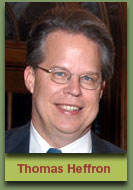 Emory University Hospital and is program director of pediatric and
living-related liver transplantation at Children’s, is the
first holder of the chair.
Emory University Hospital and is program director of pediatric and
living-related liver transplantation at Children’s, is the
first holder of the chair.
Heffron and liver transplant teams
at Emory and Children’s performed Georgia’s first living-related
liver transplant, in which part of a living donor’s liver
was given to a patient recipient. They also performed Georgia’s
first split-liver transplant in 1997, in which a single cadaver
donor organ was used for two different organ recipients. These procedures
have increased the number of organs available for children in need
of liver transplants, meaning shorter waiting periods for recipients
and lower mortality.
Hemophilia of Georgia, Inc., has awarded
gifts totaling $2.25 million to create two endowed faculty positions:
the Hemophilia of Georgia, Inc., Research Chair in Hemostasis
and the Hemophilia of Georgia, Inc., Professorship in Hemostasis.
These positions, which focus on hemophilia and other related inherited
bleeding disorders, will be located in Emory’s Department
of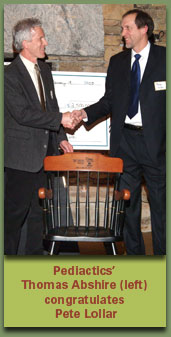 Pediatrics and Children’s hemophilia program of the AFLAC
Cancer Center and Blood Disorders Service.
Pediatrics and Children’s hemophilia program of the AFLAC
Cancer Center and Blood Disorders Service.
The first research chair holder is
John “Pete” Lollar, a physician/scientist who has devoted
his career at Emory to hemophilia treatment. For more than 20 years,
Lollar has been involved in ground-breaking research and contributions
to the structure and function of factor VIII. Among his many achievements
is the construction of a new recombinant porcine factor VIII molecule
for use in patients who develop inhibitors to factor VIII. He cofounded
Octagen Corporation, a pharmaceutical start-up, to continue development
of this new product. Currently the product, which has 13 registered
patents, is in phase 2 clinical trials. |
|
 |


 |


The
Mansour Professorship for 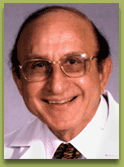 Thoracic
Surgery was established by Emory cardiothoracic surgeon
Kamal Mansour. During a residency and subsequent 36-year career
at Emory, Mansour perfected and taught thoracic surgery techniques
to reconstruct the esophagus, trachea, and chest wall following
surgery for cancer and other diseases or injuries. His gift
arises from his gratitude to Emory for encouraging his life’s
work—to train physicians not only in the United States
but also in his home country of Egypt. Thoracic
Surgery was established by Emory cardiothoracic surgeon
Kamal Mansour. During a residency and subsequent 36-year career
at Emory, Mansour perfected and taught thoracic surgery techniques
to reconstruct the esophagus, trachea, and chest wall following
surgery for cancer and other diseases or injuries. His gift
arises from his gratitude to Emory for encouraging his life’s
work—to train physicians not only in the United States
but also in his home country of Egypt.

|
 |
 |

 |
 |
 |

 ornelia
Weyand sees a paradigm shift in modern medicine. “Traditionally,
medicine has been organized around organ systems,” says the
first David C. Lowance Chair in Human Immunology. “But it’s
become increasingly clear that diseases in many different organs
share common principles of how tissue functions fail. Medical specialties
of the future will center on such common biologic pathways.” ornelia
Weyand sees a paradigm shift in modern medicine. “Traditionally,
medicine has been organized around organ systems,” says the
first David C. Lowance Chair in Human Immunology. “But it’s
become increasingly clear that diseases in many different organs
share common principles of how tissue functions fail. Medical specialties
of the future will center on such common biologic pathways.”
The new Kathleen B.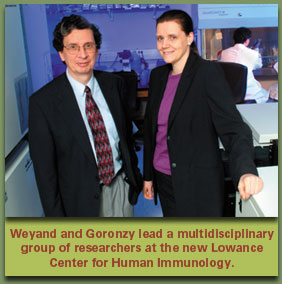 and Mason I. Lowance Center for Human Immunology at Emory takes
such a multidisciplinary approach by integrating immunology research
with other medical disciplines. The center, which opened in May
2004, seeks to improve treatment of autoimmune diseases and researches
the ways the immune system influences development of chronic disease.
Specifically, the center will study the ways that aging affects
immune system function and the role of inflammation in the development
of heart disease and other immune-related disease.
and Mason I. Lowance Center for Human Immunology at Emory takes
such a multidisciplinary approach by integrating immunology research
with other medical disciplines. The center, which opened in May
2004, seeks to improve treatment of autoimmune diseases and researches
the ways the immune system influences development of chronic disease.
Specifically, the center will study the ways that aging affects
immune system function and the role of inflammation in the development
of heart disease and other immune-related disease.
Weyand and her husband and collaborator,
Jorg Goronzy, the Mason I. Lowance Chair in Human Immunology, moved
from the Mayo Clinic to Emory to lead the effort in October 2003.
As scientists who have contributed to the basic understanding of
giant cell arteritis and rheumatoid arthritis, they are looking
beyond the traditional diseases considered to be related to the
immune system.
“The immune system causes disease
when it fails to protect us against cancer and infections and, equally
important, by driving inflammation, which we are beginning to realize
is pivotal not only in rheumatologic and allergic diseases but in
other chronic diseases as well,” says Goronzy.
The Lowance Center is funded with
a $12 million endowment begun in 1979 to honor Mason I. Lowance,
27M, an allergist and internist whose patients included such luminaries
as former Emory President Goodrich White and Atlanta mayors William
Hartsfield and Ivan Allen Jr. Since the 50 years during which Lowance
practiced, when relatively little was known about the immune system,
scientists have learned that immune disorders may result in allergies,
transplant rejection, cancer, rheumatoid arthritis, and many other
diseases. Weyand and Goronzy are bringing all of these immune-related
diseases under the microscope at the Lowance Center.

 |
 |
 |

 he
150th anniversary gala celebration marked a special night in May
for Emory School of Medicine. Held on the tented grounds of the
future site of the new medical education building and co-chaired
by Ada Lee and Pete Correll, the party brought together alumni,
friends, faculty, and staff to celebrate the past and preview the
future of medicine at Emory. Dean Tom Lawley presented details of
the school’s first permanent home on campus, followed by a
video presentation outlining the building’s potential impact
on the community’s health. John Stone, Emory’s own poet
laureate, shared a commemorative poem written for the occasion. he
150th anniversary gala celebration marked a special night in May
for Emory School of Medicine. Held on the tented grounds of the
future site of the new medical education building and co-chaired
by Ada Lee and Pete Correll, the party brought together alumni,
friends, faculty, and staff to celebrate the past and preview the
future of medicine at Emory. Dean Tom Lawley presented details of
the school’s first permanent home on campus, followed by a
video presentation outlining the building’s potential impact
on the community’s health. John Stone, Emory’s own poet
laureate, shared a commemorative poem written for the occasion.
To date, $28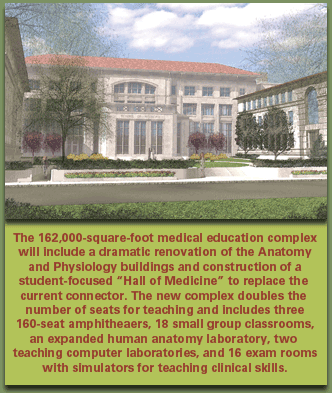 million in commitments has been raised for the medical education
complex toward a $55 million goal. The gala alone raised $300,000
for the effort.
million in commitments has been raised for the medical education
complex toward a $55 million goal. The gala alone raised $300,000
for the effort.
Members of the 150 Society (which
includes those who have given at least $150,000 to the medical school)
are leading Emory’s building drive. Current members of the
150 Society include: Margaret and Herbert L. Dupont, Peggy and Charles
F. Evans, Anne Hendrick Gaston and J. Harper Gaston, the family
of Billy R. Jones, Christine and Tom Lawley, the Rich Foundation,
John Skandalakis, UPS, and Rebecca K. and Sidney H. Yarbrough III.
In addition, UPS and the Yarbroughs served as presenting sponsors
of the gala.
The celebration also attracted many
sponsors who contributed to its success. The platinum sponsors included
Avon Products, Inc., Bombadier Flexjet, the Coca-Cola Company, Emory
Radiation Oncology, Georgia Pacific, Mr. and Mrs. Parker H. Petit,
the Whiting/Turner Contracting Company, and the Woodruff Health
Sciences Center. Gold sponsors were: Atlanta Web Printers, Inc.,
ChoicePoint, the School of Medicine Class of 1955, Ada Lee and Pete
Correll in memory of Paul Seavey, Cousins Properties, Delta Connection,
Emory Healthcare, Emory School of Medicine, Fidelity Bank, Genoa
Companies, Inc., Genuine Parts, Metroderm Surgery PC/Dr. and Mrs.
D.J. Papadopoulos, Sartain Lanier Family Foundation, Persimmon Creek
Vineyards, Walter and Doris Sanderson, and Sutherland, Asbill &
Brennan LLP in memory of Sidney Howell Fleming.
Fund-raising will continue throughout
the coming year. To join these sponsors in helping forge Emory School
of Medicine’s future, contact Phil Hills, vice president for
development, phills@emory.edu,
or Maggi McKay, senior associate vice president for development,
margery.mckay@emory.edu,
404-727-5711.
|
 |
| |
|
|
|
| |
|
|
|
|
|
|





